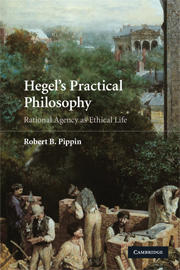6 - The freedom of the will: social dimensions
Published online by Cambridge University Press: 05 June 2012
Summary
The topic we have arrived at is Hegel's “social theory of agency,” and that topic, given how the problem of agency is usually understood, raises the immediate question of why anyone would think that sociality would have anything at all to do with the problem of agency. So it might be a good idea to back up a bit and get a running start at the problem.
As we have seen several times, that problem is understood in a number of ways; most generally – what distinguishes naturally occurring events from actions (if anything)? (Sometimes the question is: what, if anything, distinguishes responsible human doings from what animals do?) The most prominent approach has it that actions are things done intentionally by individuals, purposely, for a purpose. This is sometimes said to mean: acting from or on or because of an intention, although, as we shall see, this nominalization can be misleading. Or, of the many possible descriptions of some occurrence, it is an action if there is a true description under which it is intentional. This is often taken to mean simply that if you ask a person why he is doing something he can express this intention to explain himself, most often in the form of a reason. He does not (except in extraordinary circumstances) describe why he is acting in the way he might describe what caused his lungs to deteriorate; instead he reveals something about his own relation to his psychological inclinations and aversions; his “evaluative” relation to them, as it is sometimes put.
- Type
- Chapter
- Information
- Hegel's Practical PhilosophyRational Agency as Ethical Life, pp. 147 - 180Publisher: Cambridge University PressPrint publication year: 2008
- 1
- Cited by

